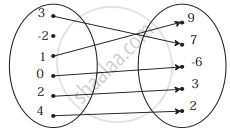Advertisements
Advertisements
Question
A function f is defined by f(x) = 2x – 3 find `("f"(0) + "f"(1))/2`
Solution
f(x) = 2x – 3
f(0) = 2(0) – 3 = – 3
f(1) = 2(1) – 3 = 2 – 3 = – 1
`("f"(0) + "f"(1))/2= (-3 - 1)/2 = (-4)/2`
`("f"(0) + "f"(1))/2` = – 2
APPEARS IN
RELATED QUESTIONS
If \[e^{f\left( x \right)} = \frac{10 + x}{10 - x}\] , x ∈ (−10, 10) and \[f\left( x \right) = kf\left( \frac{200 x}{100 + x^2} \right)\] , then k =
The domain of definition of the function \[f\left( x \right) = \sqrt{\frac{x - 2}{x + 2}} + \sqrt{\frac{1 - x}{1 + x}}\] is
Check if the following relation is function:

Which sets of ordered pairs represent functions from A = {1, 2, 3, 4} to B = {−1, 0, 1, 2, 3}? Justify.
{(1, 1), (2, 1), (3, 1), (4, 1)}
Find x, if g(x) = 0 where g(x) = x3 − 2x2 − 5x + 6
Express the following exponential equation in logarithmic form
`"e"^(1/2)` = 1.6487
If `log(( x - y)/4) = logsqrt(x) + log sqrt(y)`, show that (x + y)2 = 20xy
Answer the following:
For any base show that log (1 + 2 + 3) = log 1 + log 2 + log 3
Find the range of the following functions given by `sqrt(16 - x^2)`
Redefine the function f(x) = x − 2 + 2 + x , – 3 ≤ x ≤ 3
